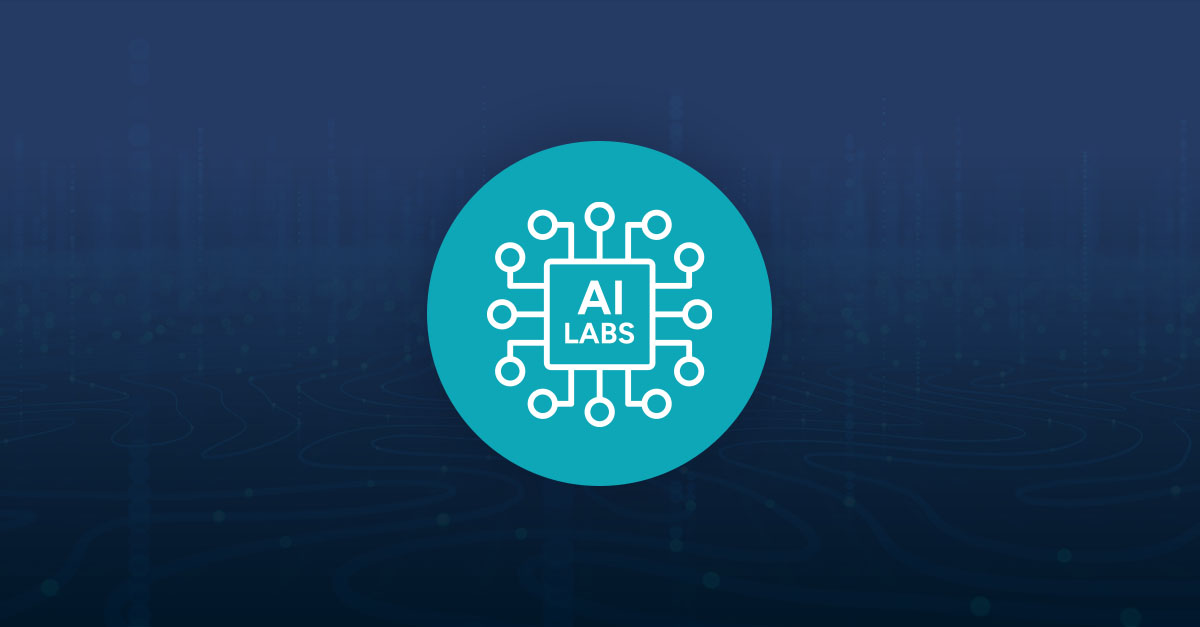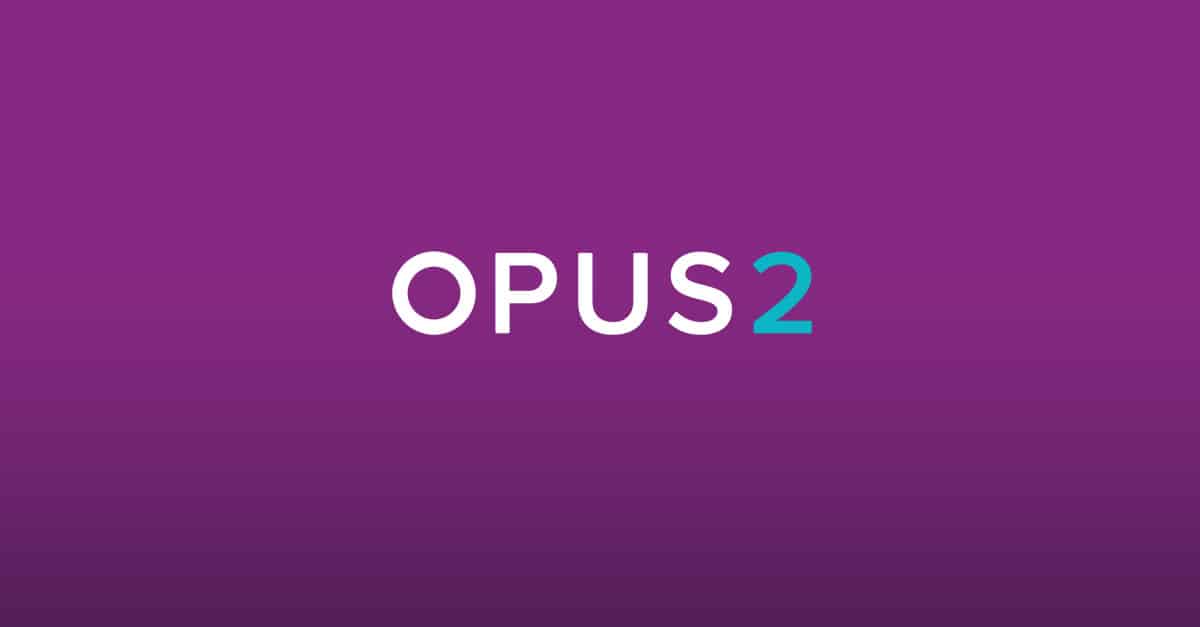This article was originally published on ConventusLaw.com on 5 October 2022.
Legal technology has become an increasingly important factor in how lawyers conduct their business, particularly during the pandemic. Without it, there would be a significant backlog of cases with, in some instances, months and months of hearing and tribunal inactivity, resulting in serious consequences for the legal industry.
The legal community, which has historically taken a conservative approach to adapting to new technologies, has demonstrated a steady increase in the use of legal technology in the past decade. The pandemic accelerated that trend, and there is evidence that many of those technology adoptions could be here for good.
Online tools – particularly those used for hearings and tribunals – have been available for over a decade, but the legal practitioners throughout the region have only become more comfortable using them recently, forced largely by the pandemic.
Like many jurisdictions, Hong Kong moved quickly to address the widespread threat that Covid was fast becoming. The Hong Kong Judiciary published a range of guidance notes for remote hearings for such institutions as the (civil) Court of Appeal, the Court of First Instance, the District Court and the Small Claims Tribunal. In addition, the Judiciary also announced a General Adjournment Period (GAP) in early 2020, which adjourned all hearings except for urgent matters. The result was a heavy reliance on legal tech to support the urgency and create a pathway for the backlog of cases.
A recent survey conducted by Conventus Law in association with Opus 2 asked a range of questions to Regional Counsel, General Counsel, Partners, and other legal professionals in the Asia-Pacific region relating to their use of and satisfaction with legal technology. The results show that momentum throughout the Asian legal community is building as law firms and their clients look to new approaches to modernise their day-to-day business.
Note: Survey based on 103 submitted anonymous responses. Only invited key law firms, general counsels, regional counsels and legal counsels were approached for this survey.
Legal technology
So, what does ‘legal technology’ entail? The survey addressed several tools, the most common being electronic discovery, filing and signature tools, collaboration and document management tools, and various analytical and research tools.
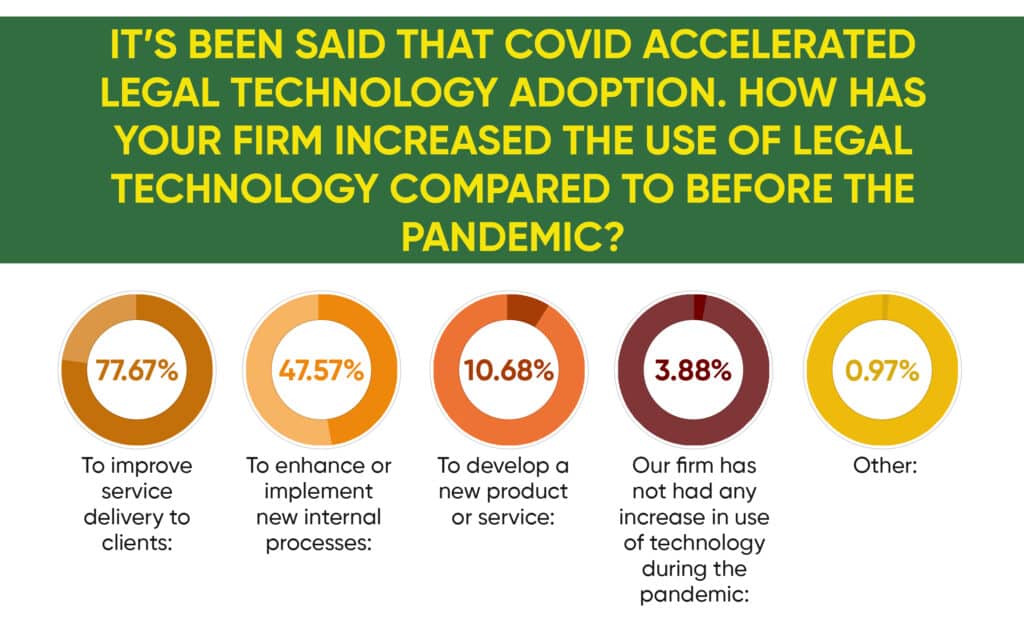
The survey asked respondents about what factors drove the decision to take on or accelerate the use of legal technology since Covid. The most popular response was to improve service delivery to clients in an environment where face-to-face meetings and travel were banned. The second most popular motivator influencing the adoption was to enhance or introduce better internal processes.
While this may come as no surprise to many in the legal community, it does beg the question: could these technology adoptions become the new norm in how lawyers and legal professionals conduct business in the future, or will old habits die hard?
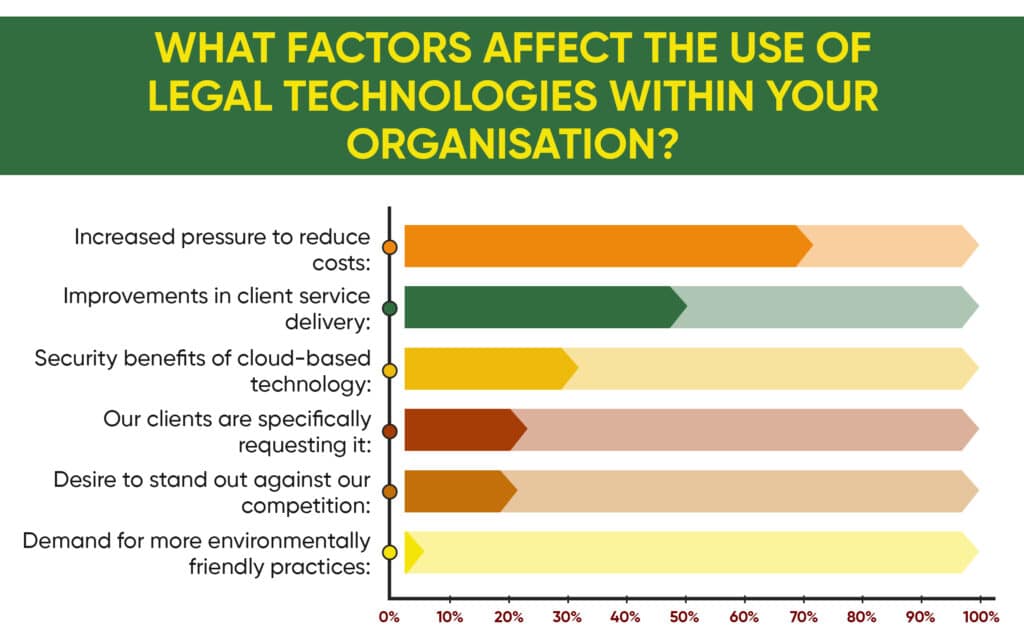
Jayesh H, Co-Founder of India’s Juris Corp, and Associate Partner Smriti Jha both said there were plenty of benefits to how jurisdictions processed online hearings during the pandemic’s peak. Notably, the ability for law firms to represent clients and make appearances on their behalf before various courts and tribunals from a remote location; time and cost-effectiveness; the eco-friendly nature of virtual hearings (by removing the need for arranging typical volumes of brief(s) and physical copies; which, as a matter of practice, has been followed for several years); the development of an integrated alternative to physical hearings, and the overall growth and evolution of a “modern” legal system.
However, while adopting new technology is seen as a boon for many, some concerns will need to be addressed to overcome perceived barriers. Cost is the overriding concern, followed by integration. Respondents also noted the complicated nature of some platforms and, of course, security and privacy issues as other obstacles. With so many law firms throughout Asia dealing with multiple jurisdictions and markets, the challenge for tech companies is to remain one step ahead in addressing those concerns.
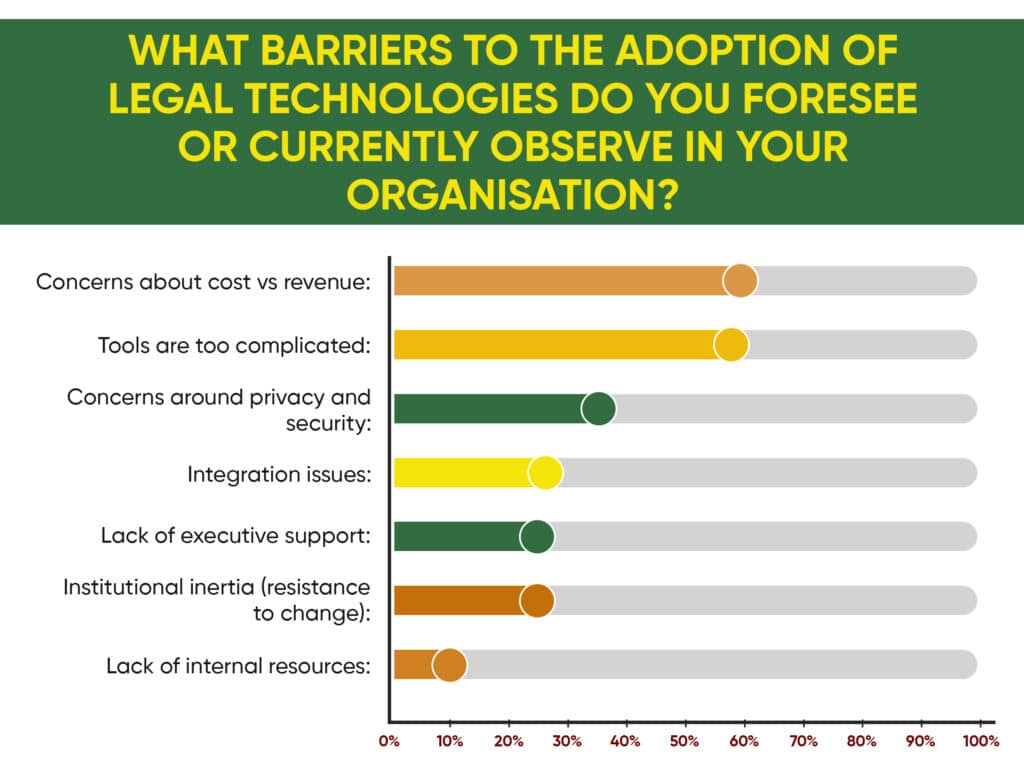
Simon Theodore, Commercial Disputes and International Arbitration Partner at Australia’s Gadens, says although his firm adapted and changed to work within the constraints of lockdown, the online system for hearings and tribunals was far from ideal.
“During Covid, we had to make adjustments as to how to meet with and advise clients, as well as processing their cases via online hearing platforms. Whilst not perfect, the online platforms enabled our work for their clients and their cases to continue largely uninterrupted, whereas other types of law, such as criminal law, that required live juries, for instance, were bought to a standstill,” he said.
Boey Swee Siang, Partner at Singapore’s Premier Law, has an experience that echoes that of Simon’s.
“Sometimes, it is necessary to observe the body language and even facial expressions of witnesses to determine if they are being truthful; to a lesser extent, it also assists counsel in conducting cross-examination if the witness is physically present. In virtual hearings, unless there is a representative from the opposing party present, one can never be certain if the witness has access to notes that he/she should not be consulting, or is being coached by someone off-camera,” he said.
The return to travel, attending conferences, meetings and networking is seen as a welcome return for many.
“While there is a time and cost issue with travel, I am more comfortable knowing I have greater control in terms of ensuring that the proper preparation and deliver[y] of documents have been taken care of when preparing or presenting in person. With the online platforms, you are hoping that there is sufficient clarity in the audio and picture quality of the platform, firstly, and then there is a concern that the other parties and the court have the material needed to move forward, whereas being there in person gives you the opportunity to respond to unexpected scenarios more promptly,” Simon said.
Rachel Foxton, Head of APAC at Opus 2 added:
“The legal sector adapted quickly when the situation demanded to embrace virtual and hybrid hearings. As restrictions have eased, in-person hearings have resumed, especially for evidentiary hearings. Although, the shift to a more digital and connected way of working has continued and virtual hearings are continuing to be favoured for procedural hearings.
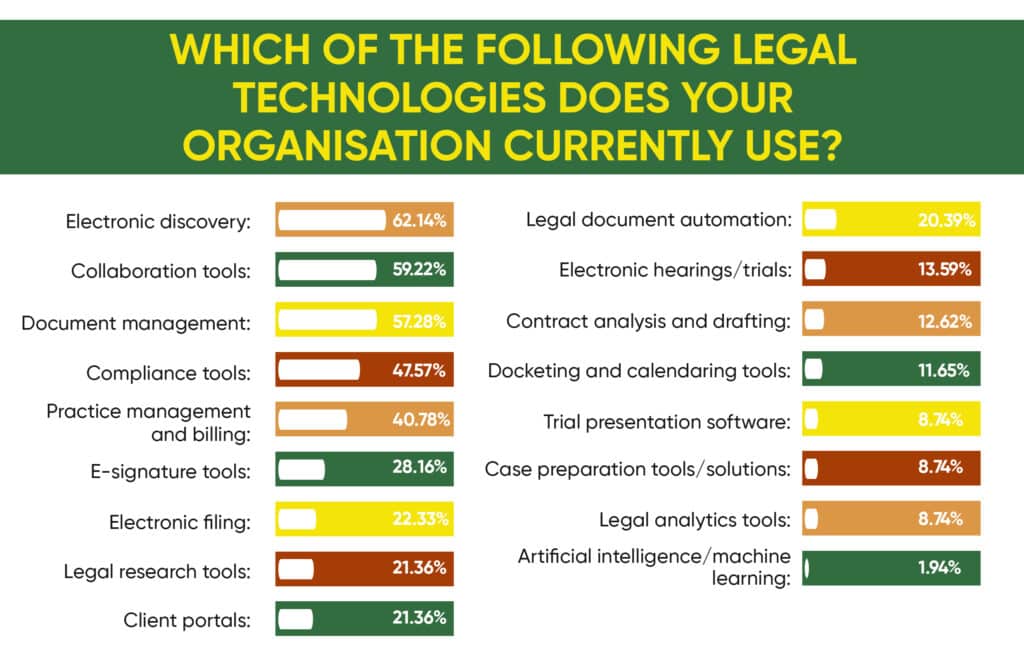
Here now and here tomorrow
The appetite for and confidence in legal technology is healthy. The survey revealed that the most common legal technologies currently used by practitioners throughout the region are electronic discovery, collaboration tools and document management.
Still, there is clearly space for new technology to fill any voids.
Respondents indicated that electronic hearings and trials and artificial intelligence (both at almost 40%), with legal document automation (35%) and trial presentation software (32%) are the technologies that are being planned for in the coming 12 months. This could indicate a shift in the way the legal community conducts their business.
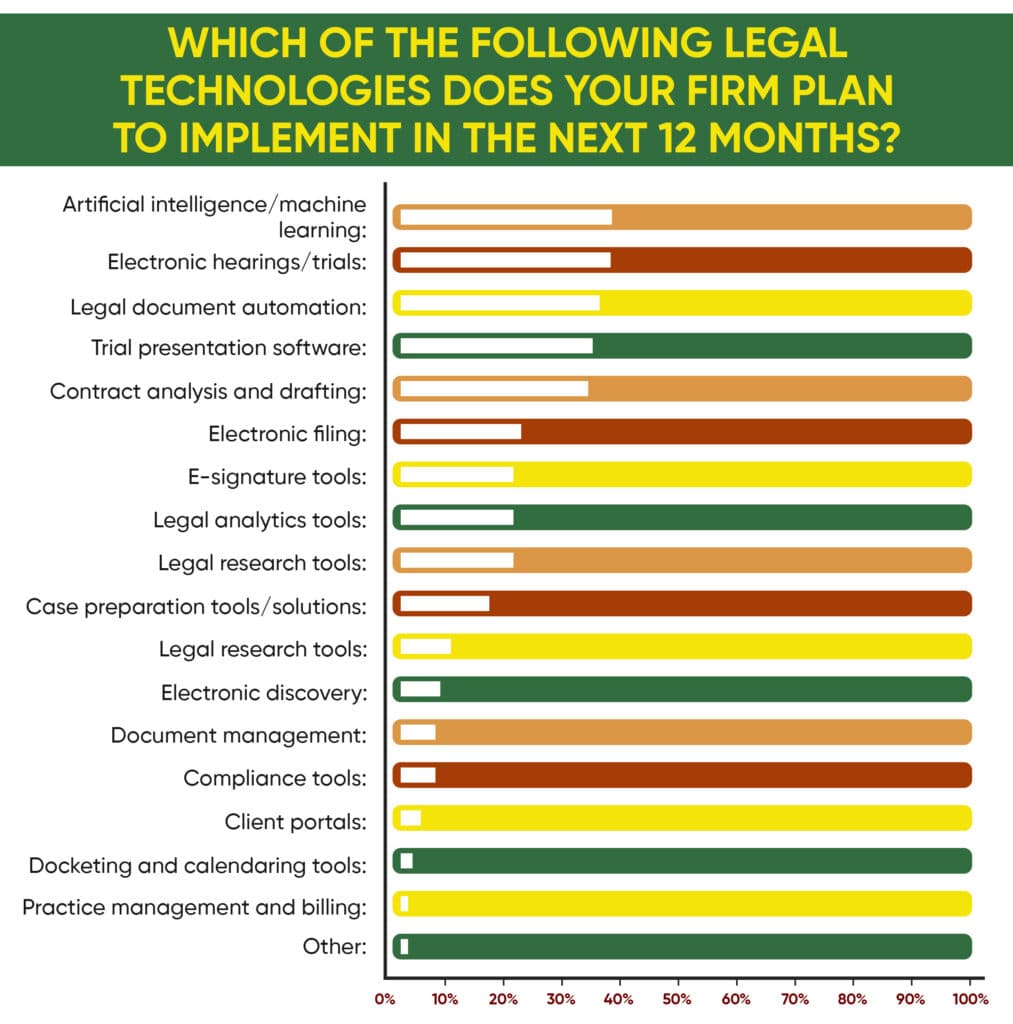
“Law firms are looking to create efficiencies and keep costs down while continuing to add value for the end client. By adopting technology solutions, law firms can overhaul their workflows, becoming more efficient and enabling legal counsel to spend less time on non-billable activities and more on substantive work for existing clients – advising, strategising to mitigate risk for business.”
Almost by definition, technology should improve efficiency, and there can be little doubt that legal technology and efficiency go hand in hand. The survey provided an overwhelming tick of approval for an improvement in efficiency.
While only 9% of respondents felt that there was an improvement in the quality of work produced, the majority felt a more accurate measure of the success (quantitative versus qualitative) of legal technology adoption was that the volume of their work increased.
As travel resumes, previous work models are evolving to incorporate the advantages and benefits of the connected digital world. Keeping costs down while improving service delivery to clients is crucial, and there is widespread support for technology to benefit the work of lawyers in future.
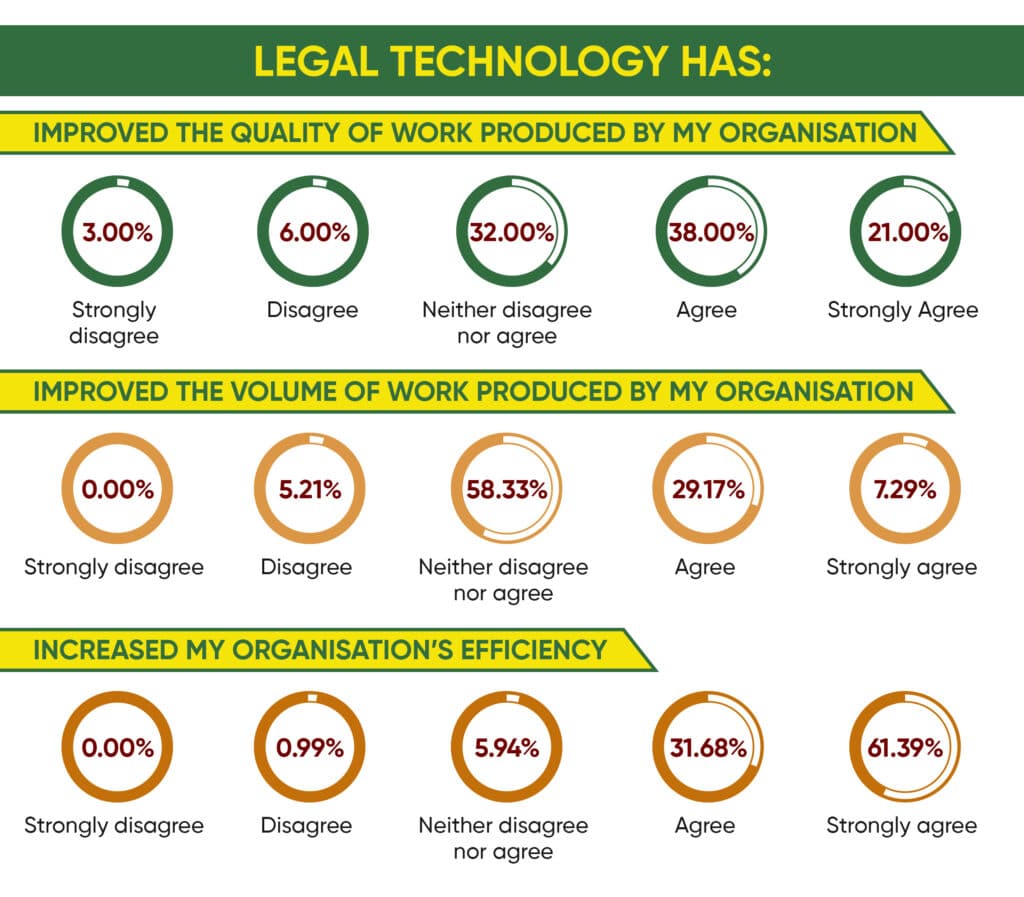
Simon McConnell from Clyde Co said:
“We predict that the industry will continue to harness the advantages and benefits of increased use of technology and the extent of use on a particular matter will depend on the nature of the matter, the physical location of all parties concerned, and of course, client preferences.
We also expect remote or hybrid hearings to remain a viable option. There are significant benefits – among them: flexibility, cost savings, and the ability to hear minor witness statements remotely.”
The Legal Tech Survey has taught us that legal technology providers must remain vigilant in understanding law firms’ challenges to provide the best possible solutions and support for law firms as they continue to evaluate their workflows and employ new technology to support and enhance their services. Legal practitioners must be open-minded and willing to learn about the technology tools available to create efficiencies in their practice and provide better service to their clients.
This report was written by Chris Bisogni for Conventus Law in association with Opus 2.
Can we help?
Please let us know if you have any questions about anything mentioned in this article or if you would like to know more about our legal technology solutions for disputes.


